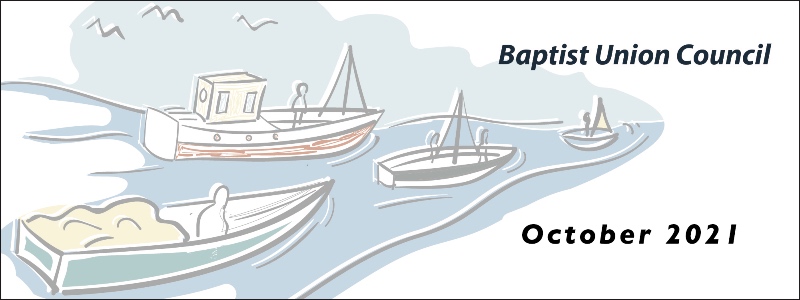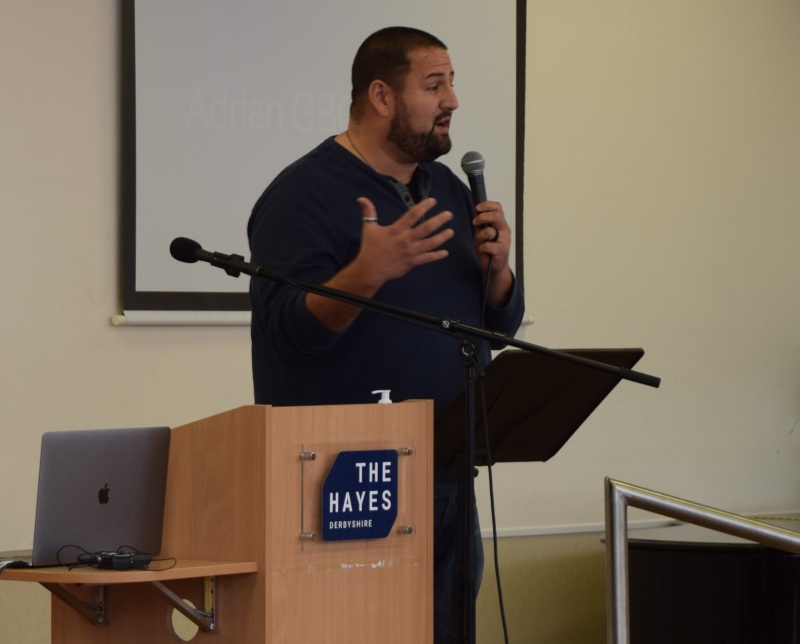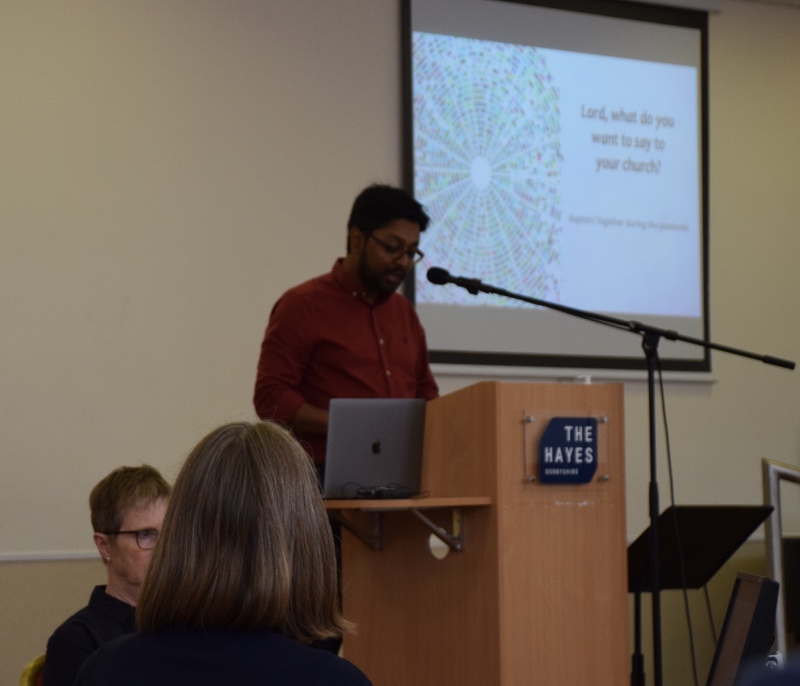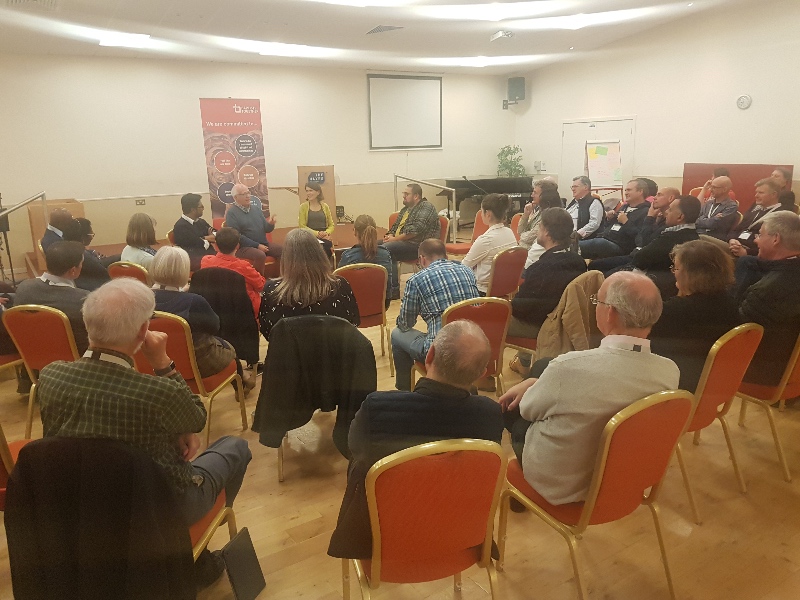Baptist Union Council: October 2021
How Baptist churches have responded in the pandemic and approval for a series of proposals aimed at supporting training for women and men into Baptist ministry were key topics at the latest Baptist Union Council.
A conversation around the differing views in our Union on human sexuality and a review and celebration of the implementation of the Ignite Report also took place, alongside the finance, trustee board and key roles nominations reports.
Held at The Hayes Conference Centre in Swanwick, Derbyshire (13-14 October), this was the first in-person Council since November 2019, as well as the first to be moderated by Seidel Abel Boanerges, the Dean of Ministerial Formation and Development at Spurgeon’s College, London.
Outgoing European Baptist Federation General Secretary Tony Peck joined Council for the live prayer broadcast on Wednesday evening, later answering questions about his 17 years in the role.

Scroll down for the following reports:
-
Worship – and a covenant prayer
-
Baptists Together during the pandemic – hearing from our churches, discerning what God is saying to us
-
Funding for Ministerial Training Working Group
-
Review and Celebration of the Ignite Report
-
Human Sexuality – Reflections from my Inbox by Lynn Green, and a request from the Eastern Baptist Association
-
St Hild’s College Membership Application
-
Finance and Pensions Update
-
The Financial Model Review
-
Baptists Together Key Roles Nominations Team
-
New member churches, churches ceasing membership of BUGB and closures
-
Prayer broadcast + reflections with Tony Peck
Worship - and a covenant prayer
 After Seidel welcomed Council members to their first in-person gathering in two years, worship was led by Adrian Semerene, minister of Gamlingay Baptist Church (EBA), with musical support from Stuart Davison (SEBA), Mark Hirst (SEBA) and Carl Smethurst (SWBA).
After Seidel welcomed Council members to their first in-person gathering in two years, worship was led by Adrian Semerene, minister of Gamlingay Baptist Church (EBA), with musical support from Stuart Davison (SEBA), Mark Hirst (SEBA) and Carl Smethurst (SWBA).
On Thursday morning Adrian spoke on Luke 10: 25-28. Although a familiar piece of scripture, I wonder if we miss some of it, he asked. Our love for God is meant to be emotional, intellectual, spiritual and physical. Maybe people find comfort in one or two of those aspects, but Jesus says we are called to love in each. And we are called to love our neighbour in that same way, even if we disagree with them.
'Does God have a challenge for us in that – how can I love you, and those around me, the way you have asked me?' Adrian asked. 'May we be a community that loves one another.'
At the end of the gathering Rupert Lazar, minister of East Barnet Baptist Church, led Council members in praying a covenantal blessing over each other. 'We've had a heartfelt cry that we speak well of each other,' Rupert explained. 'Everything in my spirit said that we need to embrace that.'
Wanting the blessing to be scripturally based, he offered Romans 14:19: 'We make every effort to do what leads to peace and mutual edification.'
Baptists Together during the pandemic – hearing from our churches
 There were two sessions devoted to how Baptists have responded in the pandemic. Stories were shared and reflected on, and Council members were asked to discern how God was moving and what He wanted to say to our churches.
There were two sessions devoted to how Baptists have responded in the pandemic. Stories were shared and reflected on, and Council members were asked to discern how God was moving and what He wanted to say to our churches.
Prior to Council, new moderator Seidel had invited Baptists to share stories of how they have responded in the last 18 months. These have been gathered alongside all the other stories already published on the Baptists Together website.
General Secretary Lynn Green and Seidel have shared what Council sensed what God wants to reflect back to our churches. Read their summary here.
The Funding for Ministerial Training Working group
Council members approved a series of proposals aimed at supporting training for women and men into Baptist ministry, including the formation of Baptist-branded crowdfunding scheme, a Baptist loan scheme, and an enhanced bursary scheme.
The proposals were about ensuring ‘we have the trained ministers we need,’ explained Ian Bunce, chair of the Funding for Ministerial Training Working Group. Council members had commissioned the group in November 2019, and Ian had presented its first report to Council in March this year.
In this latest report the group brought a series of recommendations ‘aimed at underpinning and resourcing the quality of formation and education of those called to ministry and pastoral office within the churches of our Union.’
Ian explained that all the resolutions were designed in relation to initial formation and not further degrees or Continuing Ministry Development.
‘It’s about investing in people, and we can’t do this without investing money. These proposals will not be able to pay for everyone – but if approved, they provide new ways of supporting training for women and men into Baptist ministry.’
The proposals were in two sections:
Section 1 was about communication, understanding and perception
Section 2 was about practical, tangible and finance matters
Section 1
Resolution 1. We as a Baptist Family are committed to support a quality of initial formation and education for those called to Baptist ministry – on the assumption that the training is at least to diploma level and within a college or institution supportive of Baptists Together and forming ministry within a Baptist context.
Resolution 2. It is for the benefit of all local Baptist churches and pioneering projects that those called to ministry are formed to a good standard. Therefore, through communication, education and encouragement, each local church will be invited to be partners in developing this training and the next generation of ministers.
Resolution 3. The call to ministry can come at any age. Those considering university and future careers should be encouraged to consider ministry as a valid option. Churches and those involved in the discipleship of young people are also encouraged ministry as a valid option, alongside promotional material about vocational calling from the Ministries Team.
Section 2
Resolution 4. In partnership with Stewardship, to have a Baptist branded crowdfunding scheme in which students are encouraged to set up pages within the scheme; the Specialist Teams and Associations would promote the profile to encourage other Baptists to fund them. For launch Spring 2022 for the start of the academic year in September 2022.
Resolution 5. In partnership with Kingdom Bank, a Student Loan Scheme to be launched for those unable to access a government scheme or where the government scheme does not give all that is required. Loans of up to £30k repayable over 10 years will be available to ministerial students. The final terms of the scheme to be negotiated with Kingdom Bank, likely to include a level of financial underwriting from BUGB. The Finance and Audit committee are asked to oversee and bring recommendations for the funding and terms of the scheme.
Resolution 6. The existing Student Bursary Scheme to be enhanced and further resources to be added to it. This would build upon the bursary funding already provided by the Home Mission Fund, currently £130k p.a., giving grants to students where hardship is identified. This sum may expanded through the addition of some of the Ultimate Trust monies that come to the Baptist Union, and Associations may also use part of their Home Mission. A particular bias will be for those who struggle to get sufficient support or need enhanced support due to gender, ethnicity, younger ministers, disability or other reasons.
It may be that in future a special appeal fund could be considered but at this stage it is felt that could be a distraction from the Home Mission appeal, which itself is under pressure. It is hoped this bursary scheme could release a target of £500k p.a. This would provide a half stipend for around 40 students at a time (although it would likely be more spread out than that), of around 150 training at any one time. Allocation of these bursaries will be by the Ministries Team with the Baptist Colleges Partnership.
Council members were supportive of the proposals, describing them as creative. There were some concerns about potential injustices (someone from a poorer area may find it harder to generate as much crowdfunding as a colleague from a more affluent background); there was a suggestion the proposals didn’t support those following a pioneering route. Ian explained that resolution 6 had been proposed to counter these potential injustices. Support Services Team Leader Richard Wilson said these are new tools ‘so that as many people as possible have a way in.’
All the resolutions were passed unanimously, except Resolution 2, which had one vote against, and Resolution 6, which was passed with two abstentions.
The support means the proposals have received in principle backing from Council. The details will now be worked out and be presented at a future Council.
Review and Celebration of the Ignite Report
 The first session on Thursday morning was spent reviewing and celebrating the implementation of the Ignite Report, our review into how we resource ministry.
The first session on Thursday morning was spent reviewing and celebrating the implementation of the Ignite Report, our review into how we resource ministry.
The report was commissioned by Council in March 2015, and subsequently received by Council in March 2016. It asked what forms of ministry and what support for ministry would best help us pursue the Union’s vision to ‘grow healthy churches in relationship for God’s mission.’
Phil Jump, Regional Team Leader for North Western Baptist Association, was appointed by the Baptist Steering Group to lead the report.
Presenting a box of previous Baptist reports about ministry dating from the 1970s, he explained to Council ‘there was nothing that had not been said at some point in our life together.’
‘So we wanted to ask why we are so bad at implementing our ideas,’ Phil said. ‘We wanted the report to create something that would actually be a tool for change, that people would engage with.’ This meant the report aimed to create ‘a culture of evaluation – a process of constant review.’
Ministries Team Leader Andy Hughes gave an overview of what’s been implemented. He explained that the process has been ‘going on in different places in different ways.’ Andy had led the implementation, while a small steering group consisting of Andy, Steve Finamore, Principal of Bristol Baptist College and Phil Barnard, Team Leader for London Baptists met on several occasions. Consultation has taken place with a wide range of stakeholders at different points in the process. Associations and colleges have reflected on the report and its recommendations, which has led them to make changes which they considered appropriate to their context. Andy thanked all who had contributed.
The implementation has been taking place over several years alongside other developments. First and most significant for the Ministries Team was the Historic Case Review, in which 4,500 ministerial files were reviewed. Secondly all ministerial files were also digitalised, and a SharePoint system (MIX) was created to store them.
The key theme running through the Ignite report was change. ‘The shape of ministry is changing, the context of ministry and mission is changing, and change will continue to take place whether we like it or not,’ wrote Andy. ‘Any changes we make should allow ministry to adapt, develop and flourish.’
One of the key early changes was the creation of Marks of Ministry – the core characteristics we want to see in a minister. The Marks are a measure of character, attitude and behaviour. They describe what ministers aremore than what they do.
Andy said the Marks ‘run through everything we do, they’re now embedded in all our thinking.’
Other changes highlighted include:
-
Single category of minister on the Accredited list
-
Consistent approach to discerning calling to Ministry
-
College formation reviewed and revised
-
NAMs process revised to reflect ongoing commitment to CMD (Continuing Ministerial Development)
-
CMD introduced with 500 (a third of our active ministers) already signed up
-
Ministerial Development Adviser (Tim Fergusson) appointed
-
Ministers’ files digitalised and accessible to all teams
-
Accreditation module developed on the database
-
Many processes for disciplinaries and complaints have been reviewed and updated
-
Equal opportunities monitoring introduced
-
National Ministerial Recognition Committee (MRC) meets all Council’s diversity requirements
-
A new settlement system has been developed and launched in May 2021.
Andy spoke to Council about each of these points, in turn paying tribute to Baptist colleges for the ways they are enabling people to train; MRC for its often unseen work; for the hard work of his colleagues (past and present) in the small Ministries Team; and to Tim Fergusson, the Ministerial Development Adviser whose arrival ‘has undoubtedly enabled significant additional progress to be made over the last couple of years.’
He noted that the ongoing development of work continues: we are beginning a review of the Baptist Training Partnership (that seeks to train lay leaders) and National Recognition; the concept of a voluntary code of conduct which churches can sign up to is being explored, in the wake of some ministers reporting being bullied by their churches; and the changes to the settlement system will be reviewed in autumn 2022.
Concluding his paper, Andy wrote, 'Although the implementation stage of the Ignite Report has come to an end there will always be the need to continue to develop and change to ensure that we fan into flame the gifts the Lord has given us within Baptists Together.
‘Hopefully in time we will look back and see that the emphasis on the Marks of Ministry will have proved significant in equipping godly leadership and ministry; and that the focus on CMD will enable more of us to faithfully run the race set before us.’
General Secretary Lynn Green added, ‘We felt it was so important to pause and celebrate. That list of bullet points is really important: it’s amazing what we can achieve when we work together, when we feel like one team.
‘My huge thanks to Phil and the team, Andy, Tim and all involved.’
Human Sexuality:
Reflections from my Inbox by Lynn Green, and a request from the Eastern Baptist Association
For the first time since 2016, Council reflected further on Human Sexuality. Lynn Green offered a pastoral letter as part of the Trustees Report – ‘Reflections from my Inbox’ which begins by saying:
‘Listening to many voices in the midst of our theological differences, Lynn Green offers some personal reflections to our churches about our brothers and sisters in Christ who identify as LGBTQI+, bringing a heartfelt plea that we are Kingdom communities clearly demonstrating the love and grace of Jesus’.
Lynn goes on to say ‘One particular thing that has become clear as I have listened, is that noble intentions do not neutralize the impact of harmful words and actions. When brothers and sisters in Christ find the courage to share that they don’t always feel safe and welcome, I believe that those of us who form the “majority” need to have the humility to listen carefully and reflect on how we might respond to that’.
Read this letter here.
The main discussion came through an item brought by Beth Powney, Regional Minister Team Leader of the Eastern Baptist Association (EBA). In 2019 the EBA had been asked by a small group of churches to explain its theological stance about issues of human sexuality, in particular relating to a very small number of churches in the EBA which publicly hold an affirming view of same sex marriage. Some non-affirming churches challenged the EBA by expressing their discomfort about affirming churches receiving Home Mission grants.
The EBA Council spent time reflecting and praying together, discussing these issues and felt that they stood firmly with the statements produced by the Baptist Assembly in 2014 and BU Council in 2016: they affirmed the traditionally accepted Biblical understanding of Christian marriage as a union between a man and woman, while at the same time upheld the liberty of a local church to determine its own mind on this matter, in accordance with our Declaration of Principle.
Given that these issues are of wider concern, the EBA wanted to bring this issue to the Baptist Union Council ‘in order to seek the insight and advice of the Baptist family.’ This is demonstrating the “advice seeking” process of our current dual-operating approach of how we work together as Baptists, and because we are in covenant relationship.
In introducing the paper, Beth added that she wanted to fulfil two promises: a promise to the ministers who raised the issues initially; and to the Association trustees who were seeking Council's feedback on whether they still agreed with the 2014 and 2016 statements, or if further conversation was needed.
The ensuing conversation illustrated the range of views held within our Baptist family. On the one hand, several members felt that the 2016 statement was nuanced and balanced; and had been achieved after a good and long debate. Concerns were expressed that we risk splitting our Union if we re-enter this conversation deeply, because of the theological differences held. Is the voice which wants this as loud as is being presented?
On the other hand, several members felt that a further conversation is needed, and that the 2016 Council statement was not as widely accepted as the narrative so far. Some said we are already losing people, that our silence is creating division and alienating a younger generation. We committed to having the conversation well, but by not navigating it now, we are not navigating well. Could we commission empirical research that definitively shows what our ministers and congregation members actually think?
On Thursday morning, after thanking Council for their thoughtful reflections, Lynn Green drew together the different threads expressed the previous day and in doing so prompted a compassionate and prophetic moment which recognised the challenges and yet encouraged active engagement with reality from all parts of our Baptist family. This is a summary of what she shared:
-
Human sexuality continues to be a live issue in our society and churches: pastorally, missionally and theologically.
-
We heard voices sharing that this is a moment of tremendous opportunity to be a part of a wider conversation in culture, particularly for our children and young people. And we want to play our part.
-
We heard again that people hold deep pain and deep convictions. These are very precious things that we have to hold carefully.
-
We have friends among us who feel deep pain. We heard a little of that.
-
Some feel it is right to revisit; others disagree. There was a call for research.
-
There is a desire for deep unity, one that is based on Christ and which recognises the different views in our family.
-
We also heard the basis of our Union’s Declaration of Principle that recognises the liberty of the local church to discern its own mind.
Lynn reminded and encouraged Council that it is their role to encourage and support local churches, Associations, Colleges and Specialist Teams in the biblical, pastoral and missional conversations in surrounding human sexuality. The Baptist Together website currently offers reflections, stories and resources to enable and facilitate this.
‘This is an active engagement in which everyone has to play their part. So how can we encourage local churches to be places of discernment?’
She added that the most important thing is not so much what we do, ‘but how we do it.’ 'We need to model the love and grace of Christ. To put Christ at the centre.’
She also asked how do we want the future generation of church to look back on us? Will they be able to say these were really difficult issues, but see that Christ was demonstrated in our discussions, that they demonstrated the Greatest Commandment of loving God and one another, and the fruit of the Spirit?
Lynn also noted that as well as encouraging other family to play their part, Council has specific tasks. One of these is to shape Ministerial Recognition Rules, and this will be looked at in the next Council, as a question has been raised about the consistency between the freedom of churches and ministers on human sexuality.
A lot is happening in lots of different ways,’ she said. ‘I hope in this way we can journey together.’
St Hild - recognised Baptist training college request
 The Trustees and Directors of the Yorkshire Baptist Association and East Midlands Baptist Association are nominating St Hild College for formal membership of BUGB as a ‘recognised’ [or ‘validated’ or ‘accredited’] Baptist training college.
The Trustees and Directors of the Yorkshire Baptist Association and East Midlands Baptist Association are nominating St Hild College for formal membership of BUGB as a ‘recognised’ [or ‘validated’ or ‘accredited’] Baptist training college.
Diane Watts, Faith and Society Team Leader, introduced a paper setting out a brief background and rationale for this request, with our hopes for a process to determine the way forward.
St Hild College has been working with local Baptist churches and Associations since 2013. While providing training and formation for people from a wide array of Christian traditions, the main stakeholders in St Hild College are from the Anglican and Baptist traditions. Baptist involvement is present in all the structures of the College and runs through the heart of St Hild.
Since 2014 St Hild has worked in partnership with Northern Baptist College to train and form Baptist ministers, training 15 ministers in that time and further 27 other students recruited directly by St Hild from local Baptist churches.
However, currently St Hild and its students have no direct connection with the Baptist Union. Its students and staff aren’t generally in touch with Baptist issues and contributions; and the Union is not well connected with the life of the college, despite providing significant funding for its Centre for Church Planting through the Mission Forum.
'We would like to address this,' stated the paper, 'creating increased mutual accountability and offering an accredited training route which reflects the key role Baptists play in our life.'
The proposal is that St Hild becomes a member college of BUGB, and working with YBA and EMBA and accountable to BUGB, it directly oversees training as a recognised Baptist training college.
This could develop an effective pipeline of younger leaders, church planters, church planting teams and pioneers, with a strong centre of gravity in Yorkshire and the East Midlands, the paper continued, and help address the shortfall of ministers training in the North and offering to settle in the North.
The report proposed 'a conversational and exploratory process', including:
-
A Visiting Group to be recommended by BUGB
-
The Visiting Group to journey with the YBA, EMBA and St Hild to determine the needs and opportunities for training in the region
-
The suitability of St Hild to offer validated Baptist training
-
The journey to becoming a member College of BUGB
Diane explained we are in a listening and conversation phase. The aim is to bring a much more detailed proposal to March 2022 Council.
Pensions update
There was continuing good news on pensions. ‘We’re on a good path and things continue to move in the right direction,’ said Support Services Team Leader Richard Wilson.
The day-to-day the pensions scheme continues to track around £10m ahead of the Recovery Plan and as a result the scheme assets and liabilities are very closely matched on a Technical Provisions basis (which assumes we continue to bear the risk of the scheme).
Assuming the scheme performance continues in line with the trends since the last valuation, this will bring about a key strategic choice at the next valuation (the end of 2022) as to the future funding plan. In principle, we could stop contributions as the deficit has been eliminated (subject to regulatory consent). However, this leaves the risk of a future deterioration in the scheme finances and further contributions being required hanging over employers.
The alternative is to continue to with some level of contributions (potentially reduced from the current level) until a buyout is achieved. The Employers Group are expected to consult with employers (who are mostly our member churches) during 2022. Richard explained that any reductions would not come into force until 2023 at the earliest.
The estimated liability on a buyout basis (which assumes that an insurance company is paid to take on all the risk of paying pensions) is around £37m. It has not shown the steady improvement trend in the technical provisions, but is nevertheless much lower than several years ago.
Progress is also being made on resolving several long-standing cases of employer debt.
Finance update
Richard gave an update on our finances, which presented a mixed picture. Legacies this year have been ‘very strong’, he said. However, the Home Mission appeal is 'not having a great year’, tracking around 10 per cent down on the figure from 2020.
As we cannot budget for similar levels of legacies, this means there will be a reduction of around seven per cent in funding available to all elements of Baptists Together in 2022. For instance, the reduction in budget income for Specialist Teams will be around £150,000. Given that that the Financial Model Review (see below) is about to take place, Trustees have agreed the principle of a deficit budget for 2022.
Financial Model Review
After a tender process carried out over the summer, we have appointed a consulting practice called Tricordant to support the first phase of the Financial Model Review.
In parallel with this process a steering group has been identified, consisting of Barry Walton (EBA Treasurer), Phil Barnard (Regional Minister Team Leader for London Baptists), John Levick (BUGB Treasurer) and Richard Wilson (Support Services Team Leader). The project has now kicked off with interviews in the process of being scheduled with the identified groups and individuals, including all Regional Team Leaders and Trustee Boards. An online survey will also be going out imminently for those involved in regional and national leadership.
Over the coming months we will also be gathering information on Association finances to feed into the Diagnosis Phase so we can understand our current overall financial position. This phase of work is planned to conclude with a report to the next Baptist Union Council in March 2022.
New member churches and closures
Council members were told of three churches which have joined our Union. These are:
-
London Kachin Baptist Church (LBA)
-
Burmese Mission Church (SCBA)
-
Baptist chm Tamil Congregation (LBA)
‘It’s always a joy to receive new churches,’ said Council moderator Seidel Boanerges. ‘We thank God for these churches joining our Union.’
In addition, nine churches had closed:
-
Woodford Wells Ecumenical Church (LBA)
-
Stanton Hill Baptist Church (EMBA)
-
Esperance De La Gloire (at Sudbury) (LBA)
-
Mission Evangelique Mont Sinai (LBA)
-
Evangelical Mission of the Cross of Christ (LBA)
-
Witney New Life (SCBA)
-
Trinity Baptist Church, Falmouth (SWBA)
-
Middleton Cheney (SCBA)
-
Walton-by-Kimcote Baptist Chapel (EMBA)
Elsewhere, The Willows Community Church, Torquay (SWBA) has ceased membership of BUGB. Nigel Manges, a regional minister explained how the Association had journeyed with the fellowship, but the fellowship had not wanted to adhere to our advice, and had chosen to leave our Union. ‘We still value your prayers for the community,’ said Nigel, ‘and we would hope we can reconnect with them.’
The Heart of England Revival Church had changed its name to Kenilworth Baptist Church (HEBA).
Baptists Together Key Roles Nominations
Rupert Lazar, moderator of the Key Roles Nominations Team, brought a number of recommendations to Council, all of which were backed unanimously, apart from the first, which had one abstention:
 That Peter King (pictured) serves as a Trustee for a term of three years. Peter is a lawyer and currently the Legal Director (general counsel) at HM Treasury.
That Peter King (pictured) serves as a Trustee for a term of three years. Peter is a lawyer and currently the Legal Director (general counsel) at HM Treasury.
Raphael Atta, Lois Delong, Susan Myatt, Adrian Semerene and Dion-Marie White are re-elected for a second term of three years as co-optees on Council after their initial three years of service ended.
David Pile and Dawn Brown are willing to serve for a second term of three years on the Accompanying Group.
Rupert mentioned that we continue to seek a moderator of the Trustees Board to succeed Alastair Mitchell-Baker, whose term ended in August – and encouraged Council members to keep thinking about a potential candidate.
‘We’ve prayed, agonised. We believe there is such a person in the Baptist family. Where is she? Where is he?
‘Sometimes like the story of David, we have to look outside the box. We need to come together as a family to discern. Will you be thinking? Will you be praying?’
Andrew Cowley who is the Vice-Moderator will be carrying out the essential responsibilities in the interim period. 'Andrew we are indebted to you,' said Rupert. Earlier when presenting the Trustees report, Andrew had stressed the need for a new moderator. 'We’re functioning, but we do need right person going forward,' he said.
In addition we continue to search for a successor to John Levick as treasurer. John's term doesn't end until May 2023, but 'we really do want to make this appointment sooner rather than later that we may have someone in place to shadow John and so have a smooth hand-over,' Rupert said.
Live prayer broadcast with Tony Peck
The live prayer broadcast took place on Wednesday evening, featuring Tony Peck, who is retiring as European Baptist Federation General Secretary after 17 years in post.
Following the broadcast, Tony spoke about the EBF in a question and answer session with Council members. He highlighted the challenges of religious freedom, particularly in the "stan" countries, but also in countries like France that had curtailed some religious rights in passing certain anti-terrorism laws.

He highlighted Mission Partnerships, the church planting programme which supports a church planter to plant their own congregation in their own culture, in partnership with Unions and mission partners who provide the funding for five years. It has seen more than 200 plants, and very few have foundered, even in difficult places like Turkey. The programme is 'hugely significant for EBF - one of the bits of glue that has held EBF together', said Tony. He pointed out it had received significant support from British Baptists, with our Baptist Union, BMS World Mission, and particularly Baptist Insurance supporting several plants. Collectively we are supporting nine church planters, in Cyprus, Jordan (x2), Russia, Ukraine, Poland, Italy, Serbia, and Belarus.
He said there is different understanding of Baptists across the region, which in part can be traced to the theologies of missionaries. 'There are different ways. They cause us tension from time to time, but we’ve learnt to live with each other’s differences. By some miracle, when we come together at our Council there’s a bond of unity.'
Tony also noted how well he had been supported by the respective the three Baptist Union General Secretaries he had served alongside - David Coffey, Jonathan Edwards and Lynn Green. 'BUGB is at centre of EBF life,' he said, adding 'This connectedness with our brothers and sisters is so important, particularly in this time of Brexit.'
Baptist Times, 20/10/2021